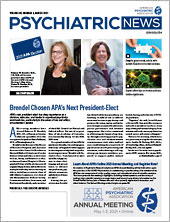Reflect, for a moment, on the vision you formed at the beginning of your career as a psychiatrist to make the world a better place. Now consider all the barriers you encounter day in and day out trying to realize that vision. Most psychiatrists I meet see those barriers—those defects—as the cost of doing business. They provide outstanding care in broken systems despite it all, spending untold amounts of time overcoming unnecessary barriers just so individuals actually get the care we know they deserve.
Now consider how health care is changing. The phrase that encapsulates the perpetually-around-the-corner transformation we’ve been promised since the passage of the Patient Protection and Affordable Care Act is value-based care. It’s a phrase that can serve as a vessel for all our hopes and dreams for how the health care system should change while, at the same time, not really promising or committing to any specifics. For those of us who work in population health, it connotes an enormously complex set of principles, structures, and workflows employed in the service of transformational change, constantly butting up against incentives and a culture that are still aligned with the old way of doing things. Whether or not value-based care is the future or simply a way station on the journey toward something totally different is unclear. But wherever we land will look and feel quite different.
In terms of realizing the collective vision we developed at the beginning of our careers, this is great news. Yet change from what we know and how we are accustomed to practicing is uncomfortable and messy and may mean giving up some things we value in return for something better. Put flatly: Our practices and our value proposition will change.
Systems, institutions, and health care professions participating in value-based payment models have become laboratories of innovation. Because this is all pretty new and we don’t really know what we’re doing, most of that innovation will fail. Yet, policy is informed by the real-world innovations that pan out despite it all. And as it applies to the needs of the individual patients we serve, along with the populations for which we will become responsible, the opportunity is tremendous. This experimentation will yield tremendous learning about how to advocate for the future of our practices and of treatment more broadly.
So, we have an emerging challenge in advocacy that requires us, along with thinking about the present, to think outside the framework of how we practice now, to consider how we thought things ought to be when we started this. And then we need to create a vision of where we will be in 10 years and identify the steps it will take to get there. We have wonderful laboratories to guide us, but nothing much will happen without all of us embracing the fact that things should be—and can be—much different.
That it makes us nervous is understandable. But this is a generational opportunity we can’t miss. I, for one, am up to the challenge. ■
If you would like to be active in advocacy, go to
psychiatry.org/advocacy, where you can learn how to get involved in shaping pro-psychiatry public policy, including becoming a member of APA’s Congressional Advocacy Network and signing up to receive the
Advocacy Updates newsletter and alerts.

